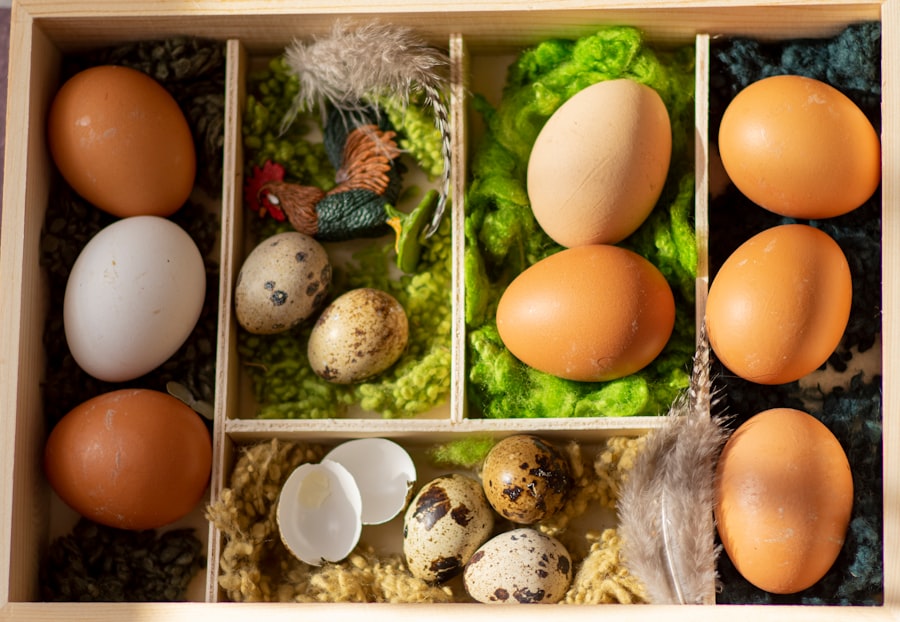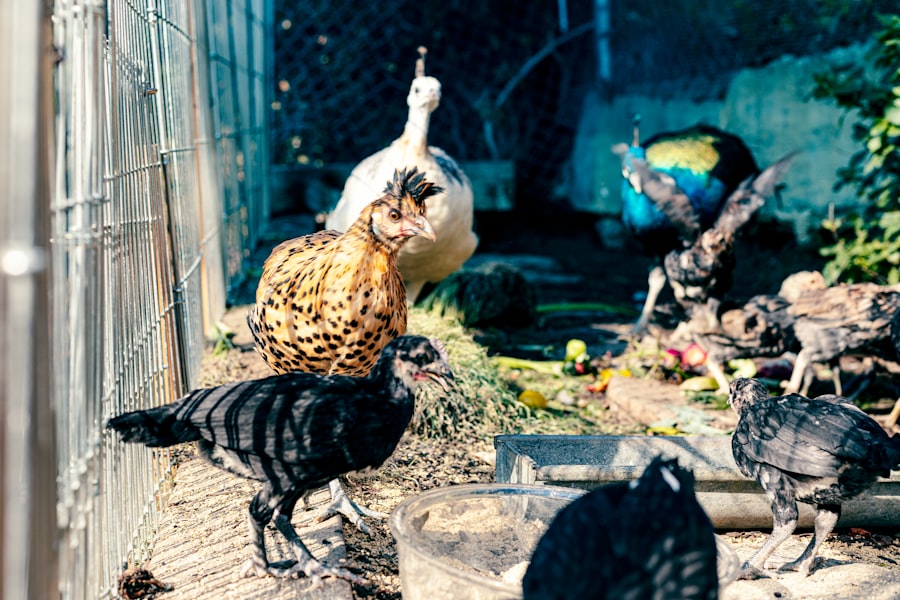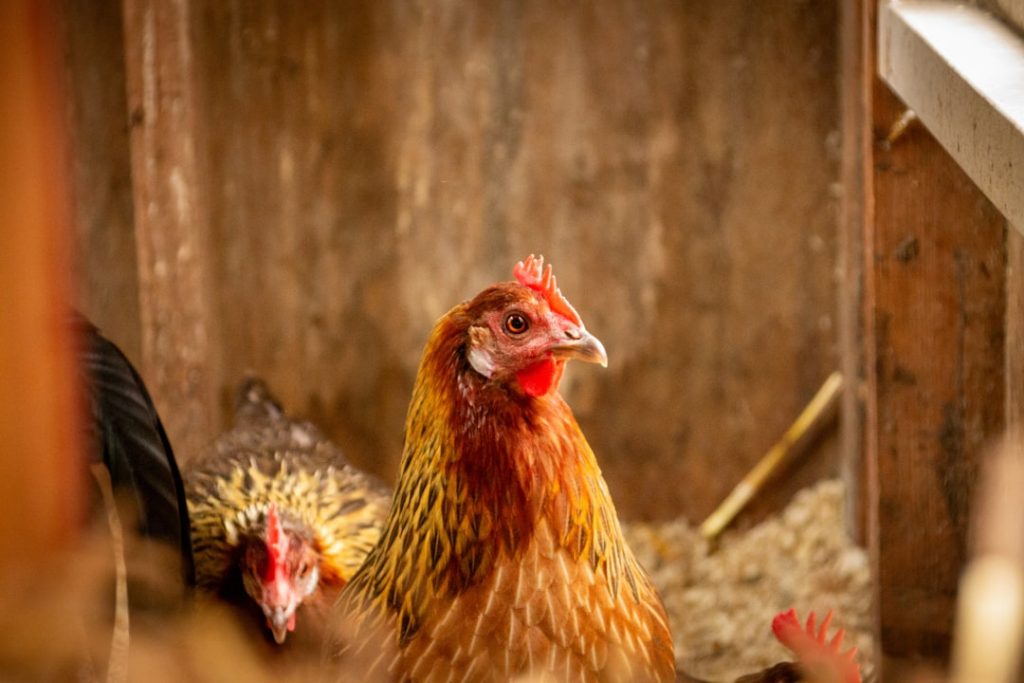When selecting a chicken breed for a backyard flock, several factors should be considered. Climate is a crucial consideration, as some breeds are better adapted to cold weather, while others thrive in warmer environments. The intended purpose of the flock is also important, whether it’s for egg production, meat, or companionship.
Breeds like Leghorns and Rhode Island Reds are known for high egg production, while Cornish Cross and Freedom Rangers are popular choices for meat production. Temperament is another significant factor, especially for families with children or other pets. Some breeds are known for their docile and friendly nature, while others may be more skittish or aggressive.
The available space is also a key consideration, as certain breeds are better suited to confinement, while others require more room to roam and forage. For smaller backyards, breeds that are content in limited spaces may be more appropriate. Conversely, breeds known for their foraging abilities might be suitable for larger areas.
It is essential to research thoroughly and consider all these factors before selecting a chicken breed, as the optimal choice will depend on specific needs and circumstances.
Table of Contents
Key Takeaways
- When choosing a breed, consider factors such as egg production, temperament, and climate adaptability
- Building a coop requires careful consideration of size, ventilation, and predator protection
- Feeding and watering should be done with high-quality feed and clean water to ensure the health of the chickens
- Providing ample space and enrichment activities is crucial for the well-being of the chickens
- Regular health check-ups and proper vaccination are essential for maintaining the wellness of the flock
- Handling and socializing chickens from a young age can help them become more friendly and easier to manage
- Regular egg collection and proper care of the eggs is important to maintain their freshness and quality
Building a Coop
Predator Protection
The coop must provide adequate protection from predators. This can be achieved by using sturdy materials and secure latches to keep out predators like raccoons, foxes, and birds of prey. Additionally, consider adding a wire mesh floor or burying wire around the perimeter of the coop to prevent digging predators like weasels and snakes from gaining access.
Ventilation and Climate Control
Good airflow is essential for keeping your chickens healthy and comfortable. Ensure that the coop has windows or vents that can be opened and closed as needed to regulate temperature and humidity inside the coop. Consider adding insulation to help keep the coop warm in the winter and cool in the summer.
Coop Layout and Design
The layout and design of the coop must meet the needs of your flock. Provide enough roosting space for each chicken, as well as nesting boxes for laying eggs. Consider adding perches and ramps to give your chickens plenty of space to move around and exercise. Don’t forget about easy access for cleaning and maintenance. By carefully considering these elements, you can create a safe and comfortable home for your backyard flock.
Feeding and Watering

Proper nutrition is essential for keeping your backyard chickens healthy and productive. When it comes to feeding your flock, there are several key considerations to keep in mind. First and foremost, make sure to provide a balanced diet that meets all of your chickens’ nutritional needs.
This typically includes a commercial feed that is specifically formulated for laying hens. Additionally, consider supplementing their diet with treats like fruits, vegetables, and mealworms to provide variety and additional nutrients. In addition to providing the right food, it’s important to ensure that your chickens have access to clean, fresh water at all times.
Consider using a waterer that is designed specifically for chickens to prevent spills and contamination. In colder climates, you may need to take extra steps to prevent water from freezing in the winter, such as using heated waterers or changing out water more frequently. Finally, consider the feeding and watering schedule for your flock.
Most chickens will eat and drink throughout the day, so it’s important to check on their food and water supply regularly to ensure that they have enough. Additionally, consider feeding your chickens at the same time each day to establish a routine and prevent overeating. By paying attention to these key factors when it comes to feeding and watering your backyard flock, you can help ensure that they stay healthy and happy.
Providing Space and Enrichment
Creating a stimulating environment for your backyard chickens is essential for their health and well-being. When it comes to providing space and enrichment for your flock, there are several key considerations to keep in mind. First and foremost, make sure that your chickens have enough space to move around and exercise.
Overcrowding can lead to stress, aggression, and health problems, so it’s important to provide plenty of room for your flock to roam. Additionally, consider adding enrichment activities to keep your chickens mentally and physically stimulated. This can include things like perches, ramps, and platforms for climbing and roosting.
You might also consider adding toys or hanging treats to encourage natural behaviors like pecking and scratching. Another important aspect of providing space and enrichment for your flock is creating a safe outdoor area for them to explore. If possible, give your chickens access to a secure outdoor run where they can forage for insects and plants.
This not only provides mental stimulation but also helps supplement their diet with natural foods. By carefully considering these elements when it comes to providing space and enrichment for your backyard flock, you can create a stimulating environment that promotes their health and well-being.
Health and Wellness
Keeping your backyard chickens healthy is essential for their long-term well-being and productivity. When it comes to maintaining the health of your flock, there are several key factors to keep in mind. First and foremost, make sure to provide regular veterinary care for your chickens.
This includes vaccinations, parasite control, and routine check-ups to catch any potential health issues early. Additionally, pay attention to the cleanliness of your coop and outdoor areas. Regularly clean out bedding, nesting boxes, and feeders to prevent the buildup of bacteria and parasites.
Consider using natural pest control methods like diatomaceous earth or herbs like lavender and mint to repel pests without using harsh chemicals. Another important aspect of maintaining the health of your flock is monitoring their behavior and appearance. Keep an eye out for any signs of illness or injury, such as lethargy, changes in appetite, or abnormal droppings.
Additionally, regularly inspect your chickens for signs of parasites like mites or lice. By paying attention to these key factors when it comes to maintaining the health of your backyard flock, you can help ensure that they stay happy and healthy for years to come.

Start Early and Be Gentle
Start handling your chickens from a young age to help them become accustomed to human interaction. Gently pick them up and hold them regularly to help them become comfortable with being handled.
Spend time with your chickens on a regular basis to help them become more socialized. Sit with them in their outdoor run or coop, talk to them softly, and offer treats by hand to help build trust and familiarity.
Establish a Routine
Another important aspect of handling and socialization is establishing a routine with your flock. Chickens thrive on routine, so try to feed them at the same time each day, let them out into their outdoor run at the same time each morning, and put them back into their coop at night on a consistent schedule. By paying attention to these key factors when it comes to handling and socializing your backyard flock, you can help ensure that they become tame and friendly members of your family.
Egg Collection and Care
Collecting eggs from your backyard flock is one of the most rewarding aspects of keeping chickens. When it comes to egg collection and care, there are several key considerations to keep in mind. First and foremost, make sure to collect eggs regularly to prevent them from becoming dirty or damaged.
Check nesting boxes at least once a day to gather any eggs that have been laid. Additionally, consider providing clean bedding in nesting boxes to help keep eggs clean before they are collected. You might also consider adding fake eggs or golf balls to nesting boxes to encourage hens to lay in the same spot consistently.
Another important aspect of egg collection is proper storage and care of eggs once they have been gathered. Store eggs in a cool place out of direct sunlight until you are ready to use them. Avoid washing eggs unless absolutely necessary, as this can remove the protective bloom that helps keep bacteria out.
By paying attention to these key factors when it comes to egg collection and care, you can ensure that you have a steady supply of fresh, delicious eggs from your backyard flock.
If you’re looking for tips on how to keep chickens, you might also be interested in this article on 10 essential features for a chicken coop. This article provides valuable information on creating a safe and comfortable environment for your feathered friends.
FAQs
What do chickens need to stay healthy?
Chickens need a balanced diet of grains, greens, and protein, access to clean water, a safe and comfortable coop, and protection from predators and extreme weather conditions to stay healthy.
How do you provide proper housing for chickens?
Proper housing for chickens includes a secure and well-ventilated coop with nesting boxes, perches, and a run for outdoor exercise. The coop should be kept clean and free from drafts, and provide protection from predators.
What should you feed chickens?
Chickens should be fed a balanced diet of commercial chicken feed, supplemented with grains, fruits, vegetables, and protein sources such as mealworms or kitchen scraps. Access to clean water is also essential for their health.
How do you protect chickens from predators?
To protect chickens from predators, it’s important to secure the coop with sturdy fencing, lock the coop at night, and use predator-proof latches. Additionally, consider using motion-activated lights or alarms to deter predators.
How do you keep chickens healthy and disease-free?
To keep chickens healthy and disease-free, provide them with a clean and dry living environment, practice good hygiene, and regularly inspect them for signs of illness. It’s also important to vaccinate chickens against common diseases and parasites.
Meet Walter, the feathered-friend fanatic of Florida! Nestled in the sunshine state, Walter struts through life with his feathered companions, clucking his way to happiness. With a coop that’s fancier than a five-star hotel, he’s the Don Juan of the chicken world. When he’s not teaching his hens to do the cha-cha, you’ll find him in a heated debate with his prized rooster, Sir Clucks-a-Lot. Walter’s poultry passion is no yolk; he’s the sunny-side-up guy you never knew you needed in your flock of friends!







